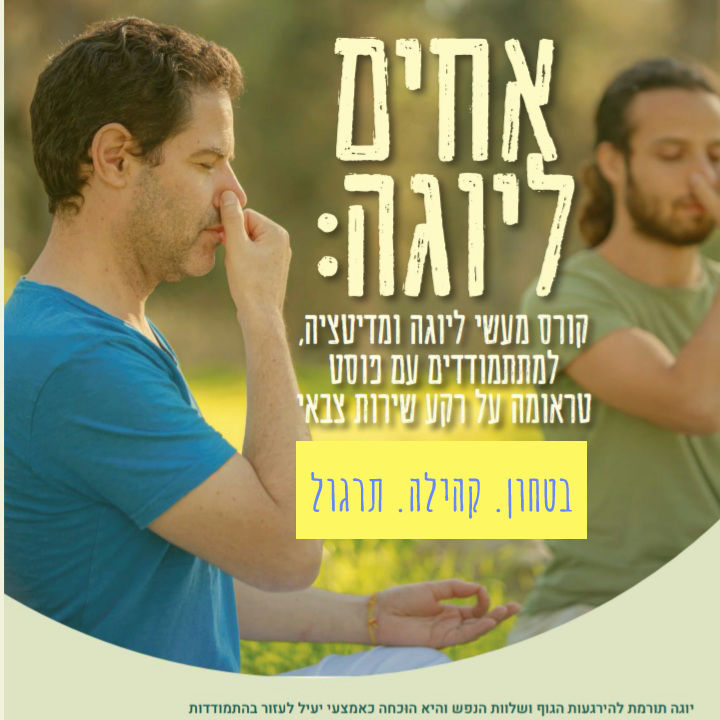Yoga, between stress and relaxation, between law and grace
- Brothers in Yoga Brothers in Yoga

- Jun 9, 2023
- 4 min read
Kindness and truth have met, justice and peace are our weapons" (Psalms chapter 5, verse 11) - this verse represents for me a longing for harmony between the measure of justice and the measure of grace. Between the parts that want to release, let go and flow and between the parts that insist on overcoming, changing and demanding. Between the part that contains the student and allows him to make mistakes and between the part that requires him to improve and bring out more of himself. Between insisting on being accepted to a workplace or a certain setting and accepting rejection as a positive thing that reflects incompatibility. The dance between these two dimensions is reflected in almost every social and personal interaction and the skill of how to act in every situation is one of the most important and subtle things in life in my opinion.
At the "Brothers to Yoga" retreat I was exposed to a spiritual path that largely deals with the tension between these two poles. The best known practice in yoga is the "asanas", the various body postures that all have a recurring motif and are a concentrated fulcrum in the body that is straining to hold the whole while all the other organs strive for deep relaxation. Even in meditation, the second most recognized practice in the world of yoga, this tension exists when the erectors of the back and neck work to keep the body in the posture of meditation while everything else is released.
One of the delightful sensations in practicing asana or meditation is this subtle distinction between the parts that work to hold the pose and everything else. In all the practices, the work of breathing, "pranayama", a life energy that flows elegantly between all the parts, relaxed and contracted, runs as the second thread. This action can also be translated into a more western semantics through transitions between the sympathetic and parasympathetic nervous system, for example, but simply every adult feels the tension between the toil of life that requires action and the flow with life that is only possible with release.
I was also happy to find in yoga a whole world of concepts that also deals with the tension between law and kindness,
For example the three virtues -
Sattva, Rajas and Tamas. These words express three qualities that can be found in everything in life.
Rajas expresses high mobility as in pop music, spicy shawarma or nerves.
Tamas expresses heaviness and turbidity as in alcohol, melancholy, etc.
Sattva is the balance between them and therefore expresses purity.

More of the same matter can be found in "Yama and Niyama", a kind of ten commandments of the yoga world, including Santosha and Tapas.
Santosha is contentment and taps is self-discipline.
All this thinking takes the longing for harmony between grace and truth as a work of life and daily spiritual work
And the person who practices it gets practical tools to do so.
As a religious Jew in my opinion from the beginning I was also happy to see how much similarity there is between the main ways in yoga and between different aspects of Judaism. For example, "Karma Yoga" is giving kindness as a way of life, "Bhakti Yoga" which has a lot of resemblance to the Hasidic way of working the heart as in the expression of the Beshat, "Rahmana Liba Baii", and "Gyana Yoga" which is equivalent to the way of the Lithuanian Talmud. Above all these The community in the ashram and the joint work of the community for spiritual progress. So with all this wealth, I'm not surprised why yoga has become so popular here in our country and probably in all western culture and practice groups can be found in every neighborhood like mushrooms after the rain. Because the vacuum left by a closing Judaism that leaves so much of its construction outside in the name of piety and halachic conservatism cannot be left vacant, and if one well has no access, then the soul will find paths to another. Here, too, there is beauty in the yoga I met in the ashram from which I learned about patience and religious openness, deep faith Because God is one and therefore He is present even in the clothes of a different religion and culture than the one I was born into.

Finally, the retreat allowed me to talk and talk with friends without western machoism.
In the group all were former fighters and officers from the special unit in which I served, men one by one. But we managed to put cynicism and ego aside and gather all these alpha males to breathe, let go and allow other sides of the soul to have a place. The beer and a cigarette in the spring, seeing Monidal together or just talking about the army is still there and we will come back to them again, but at least we found another place where we can meet and feel okay about it.
Because the balance between grace and truth is found first of all inside.Written by: Ron Cohen, graduate of the 3rd cohort of Yoga Brothers





Comments